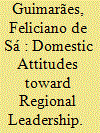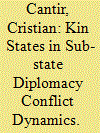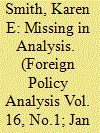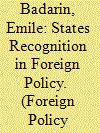|
|
|
Sort Order |
|
|
|
Items / Page
|
|
|
|
|
|
|
| Srl | Item |
| 1 |
ID:
171782


|
|
|
|
|
| Summary/Abstract |
In this paper, we analyze citizens’ attitudes toward regional leadership, employing two sets of survey experiments. Using Brazil as a case study, we analyze the first set of experiments with two types of regional leadership—structural and institutional—across three different regional issues—economic integration, regime change, and regional conflict. We found that Brazilians do not support either type of leadership, whether in regional conflict or in regime change issues, but support institutional leadership in economic integration scenarios. In the second set, we included specific South American countries both in regional conflict and in regime change scenarios. We found that Brazilians prefer Brazil to stay away from acting as a leader once neighboring countries are named in the experiment. Our findings indicate that the literature on regional leadership should incorporate the level of domestic support to understand its implications to the exercise of regional leadership. We embedded our experiments within the project “The Americas and the World: Public Opinion and International Politics, 2014–2015.” We used a nationally representative sample of eighteen hundred respondents undertaken in 2014.
|
|
|
|
|
|
|
|
|
|
|
|
|
|
|
|
| 2 |
ID:
171780


|
|
|
|
|
| Summary/Abstract |
How and why do diplomatic activities by sub-state units produce conflict with the central government? To answer this question, scholars have focused on multinational states in which at least one administrative unit—Catalonia, for instance—has an identity that is different from the rest of the country. Such noncentral governments (NCGs), the argument goes, are more likely to engage in uncoordinated bypassing activities and in the international projection of their specific identity in a manner that antagonizes central decision makers. That is especially the case if local elites are dissatisfied with the amount of local autonomy and the institutional tools available for identity protection. This article uses insights from the ethnic conflict and nationalism literature to advance sub-state diplomacy scholarship by adding a transnational dimension to the analysis. Three illustrative case studies—France-Canada-Quebec, Austria-Italy–South Tyrol, and Sweden-Finland–the Åland Islands—reveal that kin states can play a variety of roles in the triangular relationship with the kin NCG and the host state and can either exacerbate or dampen conflictual paradiplomacy. More broadly, the article is an effort to conceptualize the role of sovereign states in sub-state diplomacy.
|
|
|
|
|
|
|
|
|
|
|
|
|
|
|
|
| 3 |
ID:
171784


|
|
|
|
|
| Summary/Abstract |
Foreign policy analysis (FPA) opens the “black box” of the state and provides explanations of how and why foreign policy decisions are made, which puts individuals and groups (from committees to ministries) at the center of analysis. Yet the sex of the decision-maker and the gendered nature of the decision-making process have generally been left out of the picture. FPA has not addressed questions regarding the influence of women in foreign policy decision-making processes or the effects of gender norms on decision-making; indeed, FPA appears to be almost entirely gender-free. This article argues that “gendering” FPA is long overdue and that incorporating gender into FPA frameworks can provide a richer and more nuanced picture of foreign policy–making.
|
|
|
|
|
|
|
|
|
|
|
|
|
|
|
|
| 4 |
ID:
171783


|
|
|
|
|
| Summary/Abstract |
International relations scholars have found that multilateral approval increases public support for the use of military force and have developed competing explanations for this phenomenon. However, this literature has given little attention to the attitudes of individuals who participate directly in the foreign policy process or shape foreign policy debates. In this research note, we administer a survey experiment to both a cross-section of US foreign policy elites and a nationally representative sample of the US public. We find that US foreign policy elites are more responsive to multilateral approval than the US public, with elites with direct foreign policy decision-making experience valuing it especially highly. These findings point to the importance of considering differences between elites and the public when investigating or theorizing about the impact of multilateral cooperation on domestic politics.
|
|
|
|
|
|
|
|
|
|
|
|
|
|
|
|
| 5 |
ID:
171779


|
|
|
|
|
| Summary/Abstract |
The article analyzes Germany's policies toward Russia from an ontological security perspective. We argue that foreign policy should be seen as a tool that allows states to maintain a sense of a reasonably stable self, which enables them to cope in the changing world. We develop a three-layered model conceptualizing ontological security through narratives about the self, a significant other, and the international system and show its particular relevance for explicating policy change. When threatened by a crisis, states respond by narrative adjustment that highlights continuity on some levels, while enabling change on other levels. Developing the argument that Germany's ontological security is based in the “civilian power” narrative, we use our model to reconstruct Germany's response to Russia's wars in Georgia and Ukraine. In both cases, the discourse highlighted the ongoing validity of civilian power on the level of the international order, while challenges were accommodated by adjustments on the level of the self and the significant other. Ontological security was restored vis-à-vis the changing world by reinforcing the civilian power as a norm, while shifting blame to either both Germany and Russia (2008), or Russia exclusively (2014), for not adhering to it at a given time.
|
|
|
|
|
|
|
|
|
|
|
|
|
|
|
|
| 6 |
ID:
171777


|
|
|
|
|
| Summary/Abstract |
Can public diplomacy help resolve protracted international conflicts? Both rationalist and constructivist traditions identify significant domestic obstacles to international peacemaking. However, Robert Putnam's concept of “reverberation” implies that diplomats can expand their adversaries’ win-sets for cooperation by engaging foreign publics. This paper analyzes a most-likely case, with archival evidence: Argentine Ambassador Oscar Camilión's unsuccessful quest for Argentine-Brazilian rapprochement in 1976–77. Although the two countries later overcame rivalry, public diplomacy contributed negligibly to this success: internal Argentine divisions created mixed messages toward Brazil, Brazilian leaders launched a competing public relations operation, and these two currents obstructed and nearly terminated Camilión's mission. This case illuminates the paradoxes of Argentine foreign policymaking under military rule and offers a cautionary tale for scholars and practitioners of public diplomacy and conflict resolution.
|
|
|
|
|
|
|
|
|
|
|
|
|
|
|
|
| 7 |
ID:
171778


|
|
|
|
|
| Summary/Abstract |
States often play multiple roles on the world stage, which need not fit together coherently. Moreover, foreign policy roles may be dissonant with one another: auxiliary roles may detract from the state's master role or status. What prompts decision makers to address role dissonance and role conflict?
Building on earlier role theory research, we develop a framework that theorizes when and how role dissonance turns into conflict between a state's master and auxiliary foreign policy roles. We theorize that role conflict may be addressed through modification rather than abandonment of an auxiliary role.
The theory is illustrated with a case study that traces Russia's attempt to reconcile dissonance between its major-power role and its auxiliary role as a sending country (in intercountry adoption). We show that the interplay between master and auxiliary roles is complex. States care about status but also address dissonant auxiliary roles and role conflict pragmatically.
|
|
|
|
|
|
|
|
|
|
|
|
|
|
|
|
| 8 |
ID:
171781


|
|
|
|
|
| Summary/Abstract |
This article examines politics of states recognition. Despite the significance of the concept of recognition to international politics, only recently has international relations (IR) scholarship begun to appreciate its analytical value. How states employ their prerogatives to grant or withhold recognition has received less attention in IR. The article extends this discussion by shedding light on politics of recognition in contexts of contested states and territorial conflicts. It does so by scrutinizing Sweden's recognition of the Palestinian statehood in October 2014. The findings underline the importance of foreign policy and recognition narratives for explaining and critically evaluating recognition in such contexts; therefore, the analysis of foreign policy needs to be integrated more consistently into the study and theorization of the problem of contested states’ recognition.
|
|
|
|
|
|
|
|
|
|
|
|
|
|
|
|
|
|
|
|
|